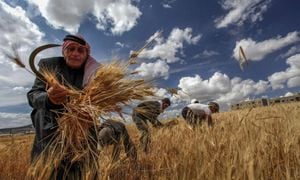Pope Francis remains hospitalized as doctors monitor his condition, now complicated by mild kidney failure. On Sunday, the Vatican confirmed the 88-year-old pontiff’s health remains "critical, but under control." His hospitalization, which began on February 14 after developing pneumonia, has prompted prayers from millions of Catholics and global leaders concerned for his well-being.
According to reports by CNN, blood tests indicated the early onset of renal failure, considered mild at this stage but still significant. The Vatican’s statement noted, "Some of his blood tests indicate initial, mild renal failure, which is currently under control." This alarming update came after the Pope underwent blood transfusions due to complications from his pneumonia, which he developed after being hospitalized for bronchitis.
Francis spent his Sunday morning attending Mass from his hospital suite at Rome's Gemelli Hospital, communicating with congregants via previously prepared messages as he was unable to deliver his usual Angelus prayer from St. Peter's Square. The message expressed gratitude to medical staff and requested prayers for his recovery: "I ask you to pray for me," he said.
The medical team has been monitoring Francis closely following his admission for breathing difficulties. Initially diagnosed with bronchitis, his condition quickly evolved to pneumonia affecting both lungs. Reports indicate he has not suffered any additional respiratory crises since Saturday evening, calming immediate fears about his precarious health.
Despite his serious health issues, Francis has remained conscious and alert. He continues to receive high-flow oxygen therapy, which has been necessary due to the complications of his pneumonia. Notably, he spent his recuperation time sitting up rather than lying down, indicative of his desire to remain engaged.
The Vatican’s medical updates have painted a complex picture of the Pope’s condition, continually stating, "The complexity of the clinical picture and the necessary wait for drug therapies to provide some feedback dictate the prognosis remains guarded." This statement reflects the Vatican’s commitment to transparency about the challenges the Pope faces.
Global reactions to Pope Francis's condition have been tremendous. Well wishes have streamed in from across the world, particularly from his native Argentina, where fervent prayers have been said at churches, including Buenos Aires' iconic cathedral. Notably, the city was illuminated with messages of support directed at the Pope. The grand imam of Al-Azhar, Sheikh Ahmed al-Tayeb, also voiced his hopes for the Pope’s swift recovery, showcasing the cross-religious support extended to him.
At the hospital, Italians and Catholics worldwide have been leaving candles and messages outside the Gemelli facility, showing their solidarity during this difficult period. "He is strong, he has always been strong, but there is nature," said Hector Armando Diaz, reflecting the public’s underlying concern for the Pope’s age and health history.
Pope Francis has long been vulnerable to respiratory illnesses, stemming from past health issues, including severe pneumonia as a young man and his recent surgery for diverticulitis. His personal history with health complications also raises concerns over potential complications from his current condition, particularly with how they might derail his papal duties.
During his hospital stay, the pontiff has shown resolve, participating as much as his health allows. Earlier, prior to his February hospitalization, he had completed extensive travels, including significant visits to Asia and elsewhere, but this break from duty has put his ability to lead the Catholic Church under scrutiny.
Following the latest developments, Pope Francis's condition is being closely monitored by his doctors, and they are employing various treatments, including blood transfusions aimed at addressing his anemia, which has plagued him during this health crisis. While they have confirmed some responses to treatments for kidney failure, complications still remain.
During kidney failure, symptoms can often remain unnoticed until they worsen significantly. The complexity surrounding the Pope’s renal health is particularly challenging. Doctors have emphasized the importance of dietary and lifestyle changes alongside treatment facing kidney issues, reinforcing the need for vigilance.
While there have been discussions surrounding his ability to continue leading following the example set by his predecessor Pope Benedict XVI, Francis himself has distanced from ideas of resignation, maintaining, "it is not the time." He remains compelled to honor his commitment to the church, even amid mounting health challenges.
A message was prepared by the unsparing Pontiff, emphasizing, "Rest is also part of the therapy!" His faithful have rallied, wise with hope and praying as the medical teams take decisive actions for his health. Catholics worldwide continue to send their best wishes, beseeching the heavens for their leader’s recovery.



